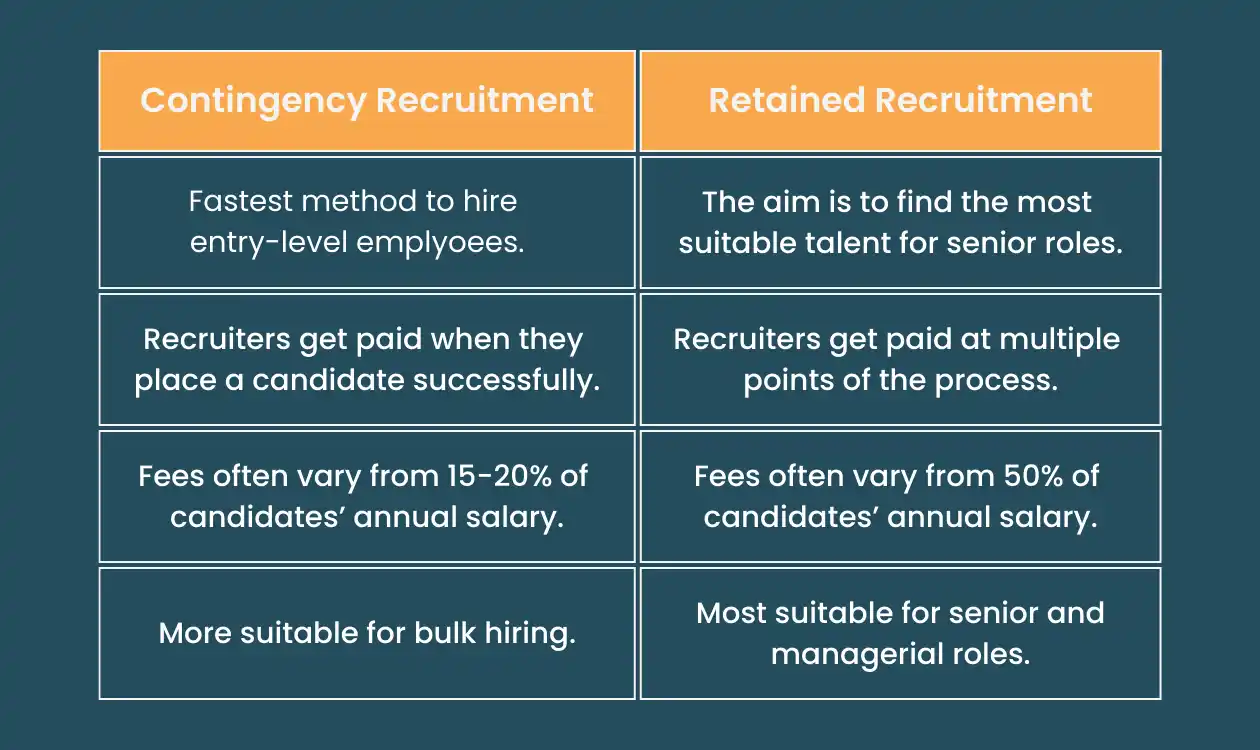TL;DR
- Contingency recruitment involves paying recruiters only upon successful hiring, ideal for urgent or general roles with low upfront risk.
- Retained recruitment requires an upfront fee for an exclusive, thorough search, suited for senior, specialised or executive roles.
- Contingency recruiters compete to fill roles quickly, but may not guarantee candidate quality, while retained recruiters offer higher quality and deeper candidate research.
- Choosing between models depends on company size, hiring frequency, and position type.
- Retained recruitment generally involves a long-term relationship and greater recruiter commitment, while contingency engagements tend to be brief and transactional.
- Both methods have their pros and cons, so align your recruitment strategy with your hiring goals and organisational culture.
- Recruitment software platforms, such as iSmartRecruit, support both models for efficient management.
A survey by Agency Central found that more than 50% of applicants use a recruitment agency as their preferred method when looking for a job. The recruitment agency offers a service that will make the process easier. So, are you planning to fill vacant positions in your organisation? Then perhaps selecting outsourcing recruitment crossed your mind. You may have questions such as:
How do I hire external recruiters?
What is the difference between Contingency vs Retained recruitment?
Which agency would be more suitable for me?
Which one serves the best candidates for the company?
Then this article got you covered with all the essential information you need to know about outsourcing recruitment services. The article perceived the core task for every organisation as seeking the right person for the right time and position. You may have considered outsourcing the recruitment process to fill a new job at your firm and bring value to your team.
So, let’s get started!
What is Contingency Recruiting?
Contingent recruitment occurs when a company engages a recruiting agency or contract recruiter to fill a vacancy of lower to mid-level open roles. The recruiting agency or contractor gets paid only if a candidate is hired. Recruiting fees average 20% of the position's compensation.
When used in conjunction with recruitment, the term "contingent" denotes that contingent workforce payments obtained by the recruiting agency are dependent on the outcome of whether or not a vacant job at your company is filled by the candidate.
How Contingent Recruitment Works?
In the contingent recruiting model, agencies that serve as independent contractors for their client firms are not compensated unless and until they successfully place a candidate in a position advertised by their client.
Even though there are some differences in how they do things, most temporary staffing agencies follow the same five steps when hiring:
-
First, the customer (your organisation) will send a job description to the recruiting agency.
-
The agency and your firm negotiate a fee that the company will pay the agency if the agency is successful in locating a candidate for the open position.
-
Third, the firm gets started looking for the best possible individual.
-
After the agency has found qualified applicants, it will provide them to the customer.
When one of these people is employed by the customer, the agency will get paid the agreed-upon amount. It's worth noting that contingency recruiting firms aren't always the only ones looking for qualified candidates. These agencies frequently compete with your company's recruitment specialists (if you have any) as well as applicants who apply directly to your job listings. You may also choose to hire multiple contingency recruiters to increase your chances of finding a candidate in a shorter period, which means agencies may compete with one another.
Pros and Cons of Contingency Recruiting
Though the benefits of contingency recruiting can be substantial, there are a few potential pros and cons.
Pros
Contingency recruiting can be a beneficial recruiting strategy for the following reasons:
-
Fees have been reduced. Recruiters work on a contingency basis, meaning they are paid only if you end up hiring one of the people they find for you.
-
Rapid Turnaround. If your organisation has to fill a position fast, contingency recruiters will be incentivised to produce within your timeline if they are hired.
-
Avoid In-house Recruiters. When you outsource your recruiting efforts, there is no need to increase the size of your office space to make room for recruitment professionals.
-
There is no long-term commitment. Contingency recruiting businesses operate project-by-project, so if you don't like their approach, you don't have to stick with them.
Cons
It may be tempting to use a third party to find qualified candidates for you, but there are certain risks to doing so.
-
It is possible to waste time. There is no guarantee that a suitable candidate will be found by the recruiting agency or contractor.
-
There is no quality guarantee. Contingency recruiters are incentivised to source a large number of candidates because they are paid on a "no hire, no pay" basis.
-
It may be inefficient. Contingency recruiting does not imply that the entire hiring process is outsourced. Organisations must still conduct time-consuming tasks such as reviewing resumes, deciding who to interview, and conducting interviews.
What is Retained Recruitment?
Retained recruitment is a type of recruitment in which an organisation pays a retainer fee to a recruitment firm in exchange for access to the firm's candidates. The firm will then collaborate with the organisation to find the best candidates for the open positions. Retained recruitment is a type of professional recruitment in which a company pays a fee to a recruitment firm to secure its exclusive services.
Statistical Models for Retained Recruitment
In the sense of retained recruitments, organisations pay the recruiter a monthly retainer for sourcing, interviewing, and shortlisting. The retainer project pricing model:
-
20% upon signing the contract and accepting the assignment
-
20% upon delivery of a shortlist of applicants
-
20% upon offer acceptance and
-
40% at the end of the first month
Advantages of Retained Recruitment
Here are the list of advantages for retained recruitment:
1. Mutual level of Commitment
A retained search goes far beyond a standard contingency effort. When it is compared to a standard contingency search, the industry average suggests that you will receive five times the amount of man-hours spent on your vacancy. This time allows the recruiter to cover the entire market and interview a large number of qualified candidates. To justify that kind of effort, we need a client's committed support.
2. Quality and Quantity of Results
A retained program gives us the time to find the best available candidates in the marketplace rather than referring to the first qualified person we come across. This ensures that you get the best value for your money and the person who best fits your opportunity.
Seeking multiple-role candidates? Multiple recruiting firms might make it challenging to keep track of candidates. Retained searches provide a single point of contact for recruiting. You are notified at every stage to keep track of activities and maintain control. You no longer have to deal with various applicants from multiple sources.
3. Cost Effectiveness
Most of our clients are surprised to learn that retained search typically costs no more than contingency - even when expenses are factored in. The reason for this is improved cost-effectiveness for us. To date, our retainer completion rate has exceeded 95%, compared to an industry average of 10% on contingency.
The Advantages That Employers Get in Retained Recruitment
-
Access to passive candidates who are not otherwise available in the market.
-
A faster recruitment process due to additional resources dedicated to the position
-
A client-driven process, individually tailored to them
-
Dedicated advertising response is on a 'first option' basis for the duration of the campaign
-
Achieving Corporate Profile Retained Project Managers handle a lower volume of assignments than contingency to ensure their results.
Difference Between Contingency and Retained Recruitment
1. Methods of Payment
When comparing retained versus contingent search, remember that as an HR executive, you trust and invest financially in the agency before receiving a shortlist.
in addition, the difference between them is straightforward. In retained recruitment, the recruiter is paid an upfront or scheduled fee and works on an exclusive basis, which means that they only will be working on the search.
Contingency recruitment, on the other hand, operates on a "no win, no fee" or "success fee" basis. Multiple recruiters may be invited to look for qualified candidates in contingency recruiting. Someone is compensated if they find and place a candidate. They won't if they don't.
2. Relationship with an Organisation
When an organisation conducts retained recruitment, it means they establish a long-term relationship with the agency. Retained recruitment takes time to understand the company, industry, and recruitment requirements better to find the best candidates.
Whereas contingency agencies typically work shortly with an organisation to find out the requirement for the open before starting the sourcing of potential candidates. Hence, the agency won’t need to build a close relationship.
3. Recruitment Expenditure
Retained recruitment is more expensive upfront, but it can often cost the same in the long run. In essence, a client pays a portion of the fee upfront to a recruitment agency to source the best talent, demonstrating their commitment to hiring, and they collaborate closely through the placement. Working on a contingency basis can be less expensive at that time, but there is no upfront fee, so the risk is reduced because you only pay if the recruiter is successful.
4. Quality vs Quantity
Retained recruitment concentrates on finding a few quality candidates for senior and managerial roles. Thus, it requires a lot of time to determine the needs of the business, locate suitable talent, and prepare the applicants for the interview screening.
However, that’s not the case with contingency recruitment, as it focuses more on sourcing and hiring a large-scale candidate within the organisation. But, it doesn’t provide certainty of the quality of the new hires.
Contingency vs Retained Recruitment: Which One to Choose?
Choosing the right recruitment model for your organisation boils down to understanding your unique needs. Here's a simple breakdown to help you decide between contingency and retained recruitment:
1. Consider Your Company Size
- Small to Medium Businesses (SMBs): If you're a smaller company with occasional hiring needs, contingency recruitment might be your best bet. You only pay if a hire is made, which can be cost-effective and low-risk.
- Large Organisations: Retained recruitment could be more suitable for larger firms with consistent hiring needs, especially for senior or specialised roles. The upfront investment often translates into a more dedicated search and potentially higher-quality candidates.
2. Assess Hiring Frequency
- Occasional Hiring: If you hire infrequently, the no-cure-no-pay model of contingency recruitment can be appealing. This model means you’re not on the hook for fees unless a hire is made.
- Regular Hiring: Companies with regular hiring cycles might find more value in retained recruitment. This model involves a commitment from both the recruiter and the employer, often leading to a deeper understanding of your long-term hiring needs and a more tailored candidate search.
3. Type of Positions to be Filled
- General Positions: For more generalist roles, contingency recruitment often suffices. The wide net it casts can capture a broad range of candidates suitable for such positions.
- Specialised or Executive Roles: For specialised or higher-level executive roles, retained recruitment is generally preferred. This approach allows for a more focused search, targeting candidates who not only have the right skills but also fit well within your company culture.
In essence, think about what you need most from a recruitment partnership - flexibility and cost-effectiveness or depth of search and strategic alignment. Your choice will shape your approach to securing the right talent.
Conclusion
So, you've learned about these two main paths when working with recruitment agencies: contingency and retained recruitment.
Contingency recruitment is like going to a bustling market. It's fast; you only pay if you hire someone, and multiple agencies might be working on the same role. It's great for filling urgent or lower-level positions, but it can be a bit chaotic with less personal attention.
Retained recruitment, however, is more like hiring a personal shopper. You pay upfront for a dedicated, thorough search. It's exclusive, so only one agency works on the role, and they're in it for the long haul. This approach is ideal for senior or specialised roles where you need that extra attention to detail. See and access valuable insights in our Comprehensive Resource for Executive Search.
So, which one should you choose?
It really depends on your needs. If you're in a rush or filling a more general role, contingency might be your best bet. But if you're looking for a key player and want a more personal, thorough approach, retained recruitment is likely the way to go.
At the end of the day, both methods have their pros and cons. It's all about what fits best with your hiring goals and company culture.
As an experienced HR professional, I've seen both work wonders in the right situations. The key is knowing what you need and choosing the path that gets you there.
Frequently Asked Questions (FAQs)
1. What is the difference between contingency and retained recruitment?
Contingency recruitment means you only pay the recruiter if they successfully place a candidate, while retained recruitment involves an upfront fee and a dedicated, exclusive search process. Retained recruitment typically delivers higher-quality candidates and is used for more senior or specialised roles.
2. Is retained recruitment only for executive roles?
While retained recruitment is commonly used for executive search, it’s also ideal for any position that requires discretion, niche expertise, or a high-calibre candidate pool. It’s about the importance and complexity of the role, not just the seniority.
3. Which method should I choose for senior executive roles?
For C-suite or senior leadership positions, I’d almost always recommend retained recruitment. You’re essentially buying their full attention and expertise - they’ll dig deeper into the market, spend time understanding your company culture, and won’t be distracted by other clients’ urgent requirements.
4. Do recruitment software platforms support both models?
Yes. Leading recruitment software like iSmartRecruit supports both contingency and retained models. You can tailor workflows, track placements, manage recruiter–client collaboration, and generate reports specific to each model, all within one system.
5. How long does the retained recruitment process usually take?
Retained recruitment typically takes longer than contingency because of its thorough approach. Expect anywhere from 6 to 12 weeks, depending on the role’s complexity and market availability. The extra time allows for deeper candidate research, multiple interviews, and a tailored fit to your company culture.














